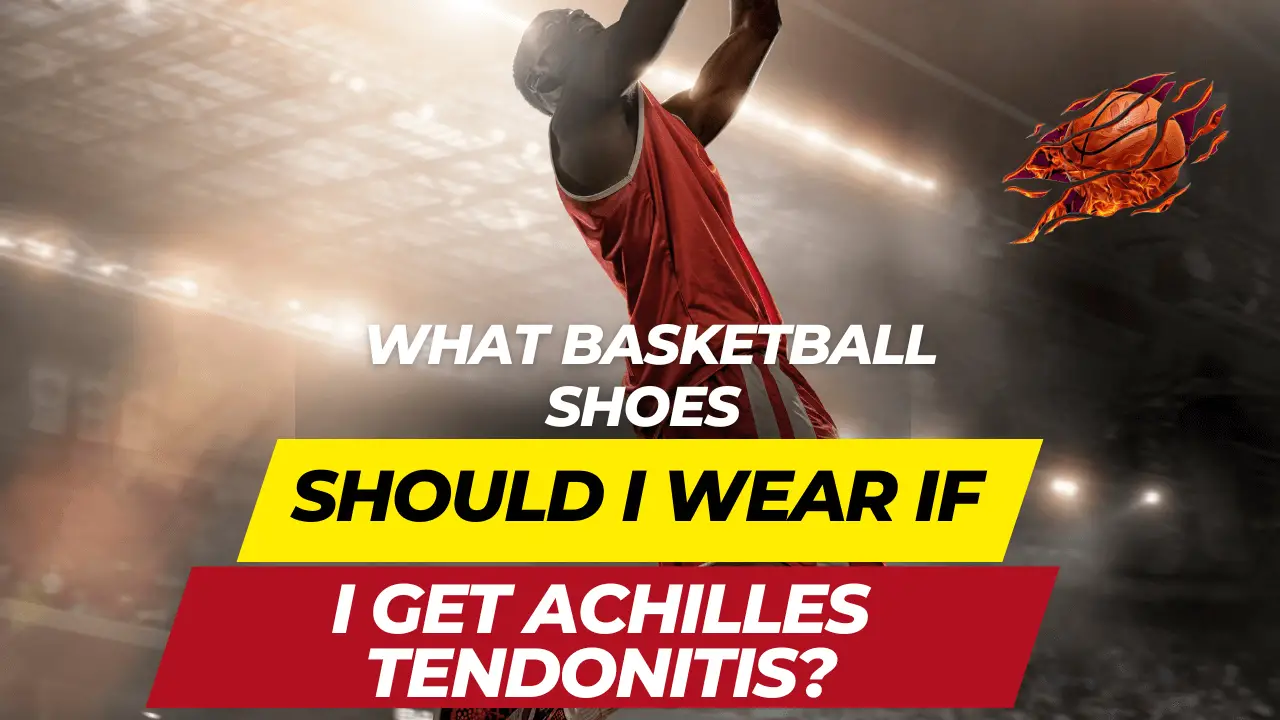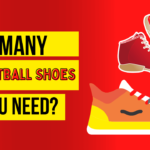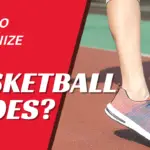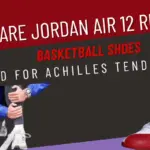You should look for three things in a basketball shoe if you have Achilles tendonitis:
-
- Cushioning
- Arch Support
- Lightweight and Low-Profile Design
Cushioning is essential to protect your Achilles tendon from impact. Look for a shoe with good cushioning in the heel and forefoot.
Arch support is also vital to reduce stress on the Achilles tendon.
A lightweight, low-profile shoe will also help minimize the impact on the Achilles tendon.
Can I Play Basketball With Achilles Tendonitis?
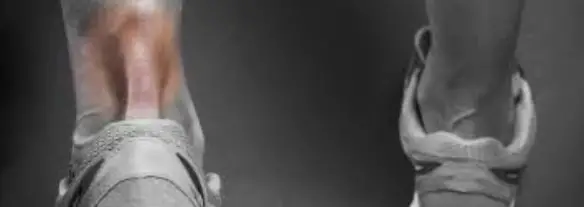
Yes, but there are certain things you need to keep in mind.
- First, you need to make sure that your Achilles is properly healed before you start playing again. If it’s still painful or swollen, you need to wait until it’s better.
- Second, you need to wear the right shoes. Basketball shoes should have good cushioning and support to protect your Achilles from further injury.
- Finally, it would be best if you were careful not to overdo it. Start slowly and gradually increase your activity level as your Achilles feels better. If you push too hard too soon, you could end up re-injuring yourself.
For basketball enthusiasts and athletes, the thrill of the game often outweighs any physical discomfort they might experience. However, when it comes to Achilles tendonitis, a condition characterized by inflammation of the Achilles tendon, it becomes crucial to prioritize both performance and injury prevention. Achilles tendonitis can significantly impact one’s ability to play basketball comfortably, and without proper care, it may worsen over time. Nevertheless, the right choice of basketball shoes can make a world of difference for players dealing with this condition.
Best Basketball Shoes For Achilles Tendonitis:
If you’ve been playing basketball for a while and are experiencing pain in your Achilles tendon, you may be wondering what type of basketball shoes you should wear. Achilles tendinitis is a common condition among middle-aged and professional athletes, especially those who participate in sports that involve a lot of running and jumping. It occurs when the tendon connecting the calf muscles to the heel bone becomes inflamed due to overuse or injury. For basketball players who has achilles tendinitis a good option would be the “Air Jordan Retro Dub Zero”
Air Jordan Retro Dub Zero
The Air Jordan Retro Dub Zero basketball shoe is widely recognized as one of the most popular and iconic basketball shoes ever created. Its design aims to offer maximum cushioning, stability, and foot support, making it an excellent choice for improving performance and guarding against Achilles tendonitis. I own a pair of these shoes and not only use them for playing outdoor basketball but also wear them casually due to their appealing design. These basketball shoes are constructed with a full-length Air-Sole unit, providing exceptional cushioning and responsiveness. The midsole’s shock absorption capabilities help reduce impact during intense activities like rebounding. During testing, I intentionally performed high jumps and hard landings to assess their impact protection, and they performed exceptionally well. The shoes feature a molded rubber outsole, contributing to their durability and excellent traction on the court – a hallmark of Jordan shoes that every basketball player appreciates. The unique lacing system of the Air Jordan Retro Dub Zero ensures a secure fit and lockdown feel, preventing the foot from slipping inside the shoe. A crucial factor in avoiding Achilles tendonitis.
- The full-length Air-Sole unit provides a supportive fit suitable for all foot types.
- The molded rubber outsole prevents ankle rolling and ensures reliable durability both indoors and outdoors.
- The secure lacing system allows for customized tension.
- Available in multiple colorways.
- The shoe may not be as breathable as other basketball shoes.
The right basketball shoe can help prevent this injury and keep you on the court. Our findings show that the best basketball shoes for Achilles tendonitis are.
Nike Men’S Zoom Freak 1
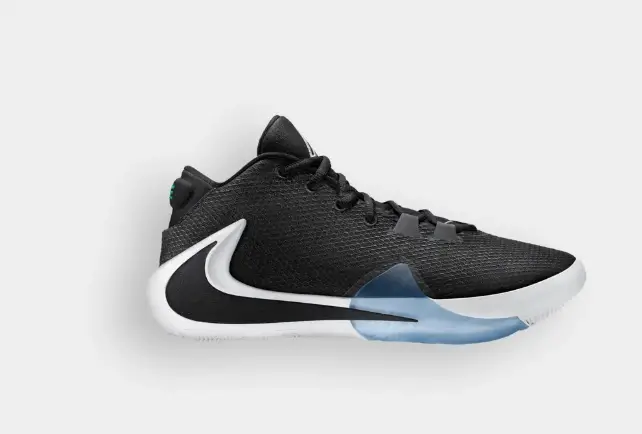
Nike Men’s Zoom Freak 1 basketball shoes are the perfect choice for anyone suffering from Achilles tendonitis. These shoes provide excellent support and cushioning, which helps to protect the Achilles tendon from further injury. They also have a special design that helps to distribute weight evenly throughout the foot, which reduces stress on the Achilles tendon.
Nike Giannis Immortality
The Nike Giannis Immortality basketball shoes offer a perfect blend of style and function. The Flyknit upper material provides a supportive and breathable fit, allowing for greater flexibility and natural foot movement. The full-length Zoom Air cushioning unit delivers excellent responsiveness and impact protection, minimizing strain on the Achilles tendon. The unique lacing system and mid-to-high-top design further enhance ankle support and stability, ensuring players can make quick cuts and changes in direction with confidence.
- Foot-conforming Flyknit upper material makes give these a supportive fit
- Incredible traction offers multidirectional grip
- Perfect combination of style and function
- Some players may not like the low high-top design
- Require long break-in period
Reebok Shaq Attaq Retro
The Reebok Shaq Attaq Retro Basketball Shoes are tailored to provide exceptional protection against Achilles tendonitis. The shoe’s upper part, made from synthetic and leather materials, offers excellent breathability and durability, making them suitable for outdoor play. The padded tongue and collar ensure optimal cushioning and comfort, while the pump feature provides additional customized cushioning around the foot. The lightweight EVA foam midsole and high-quality rubber outsole contribute to stability, traction, and overall support on the court.
- Ultra high-top design provides exceptional Achilles support and protection against ankle twists
- Old-school pump feature for extra cushioning
- Textile and synthetic materials offer breathability
- Orthopedic sockliner improves lateral movements
- Funky retro designs available
- Tongue is bulky due to the pump
- Hard to get an exact fit every time with the pump feature
Under Armour 3Z6 Basketball Shoes
The Under Armour 3Z6 basketball shoes are a top-rated choice, offering great heel and ankle support for players seeking relief from Achilles tendon pain. The mesh upper design provides a lightweight fit, enhancing speed and agility. The foam midsole features Charged Cushioning and Micro G technologies, offering responsive cushioning and protection during high-impact activities. The full-length Pebax plate ensures the foot remains centered on the footbed, reducing strain on the Achilles tendon and promoting stability.
| Feature | Description |
|---|---|
| Cushioning Technology | Micro G cushioning minimizes Achilles strain. |
| Ankle Support | Padded collar and adjustable lacing for enhanced support. |
| Breathable & Lightweight Materials | Upper materials keep feet comfortable during extended play. |
| Traction Pattern | The herringbone outsole pattern provides excellent grip. |
| Achilles-Focused Design | Tailored support for players dealing with Achilles issues. |
| Comfortable Cushioning | Plush cushioning for prolonged wear without discomfort. |
| Durability | Constructed for lasting performance on the court. |
| Sizing | Sizing may run slightly small; consider half-size up. |
| Outdoor Play | Traction might wear out faster on outdoor courts. |
I’ve got to start by highlighting the Micro G cushioning technology in these kicks. It’s a game-changer for anyone with Achilles concerns. The responsive and plush cushioning minimizes strain on the Achilles tendon, making those jumps and quick moves a lot less taxing.
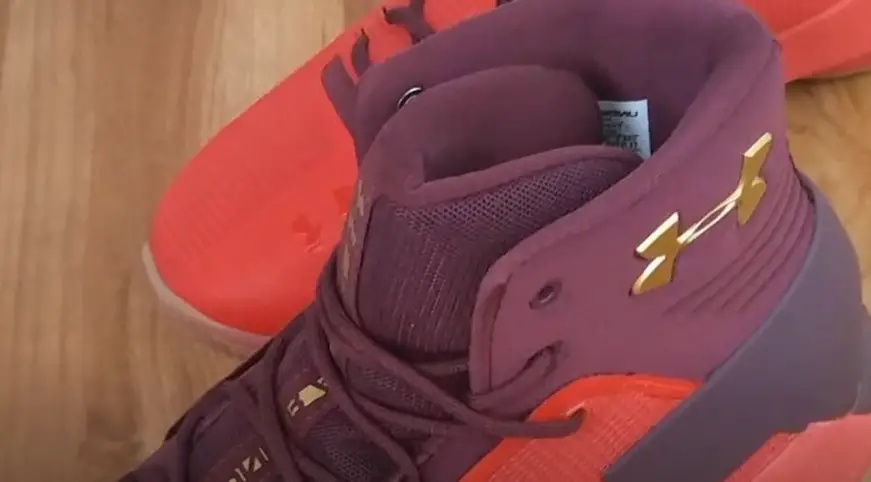
The enhanced ankle support, courtesy of a padded collar and adjustable lacing system, is a real win. It’s like having a supportive friend wrapped around your ankles, offering that extra layer of protection and stability.
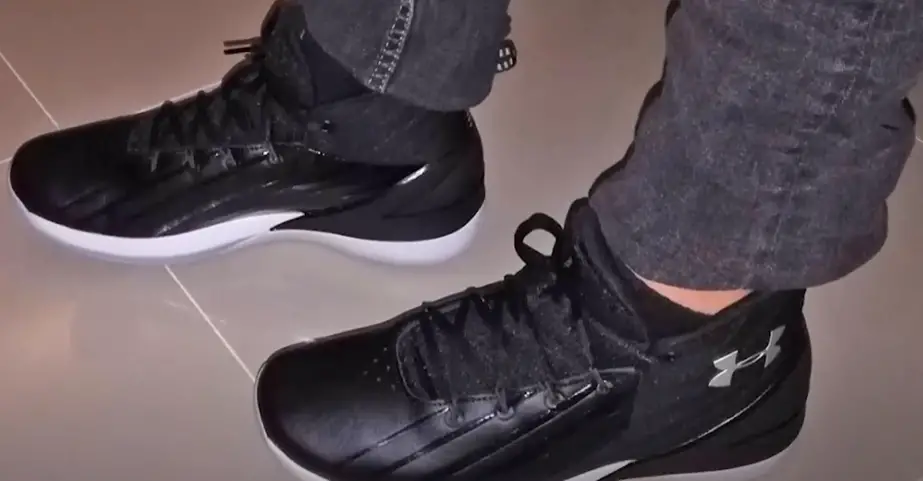
Long games demand comfort, and these shoes deliver. The breathable and lightweight upper materials keep your feet fresh even during the most intense matchups. No more sweaty discomfort slowing you down.
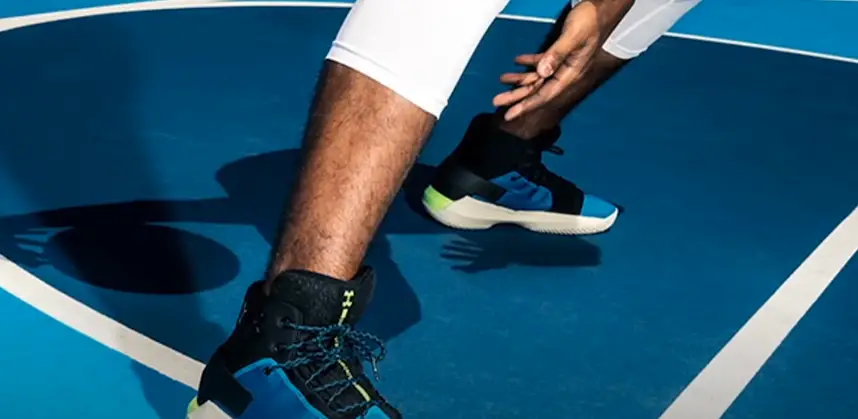
The herringbone traction pattern on the outsole is a game-saver. It ensures you stay planted on the court, even during those lightning-quick cuts and pivots. Trust me; this grip is a game-changer.
If you’ve been battling Achilles problems, these shoes are tailor-made for you. They offer optimal ankle support and stability, making them a go-to choice for players dealing with Achilles-related concerns.
The cushioning not only protects your Achilles but also keeps you comfortable during prolonged wear. Whether it’s a nail-biting overtime game or a rigorous practice session, these shoes have your back – or rather, your feet.
Durability matters, especially for athletes. These shoes boast a durable construction that can withstand the rigors of the court. Minimal wear and tear even after consistent use is a testament to their longevity.
One small caveat to consider is that the sizing might run a tad small for some individuals. If you’re on the edge of a size, consider going up for that perfect fit. It’s a minor adjustment for maximum comfort.
For those who enjoy outdoor games, a word of caution: the traction might wear out quicker on outdoor courts. While these shoes excel indoors, they may not be the ideal choice for prolonged outdoor play.
- Cushioning Excellence: The Micro G cushioning technology stands out, delivering a superb blend of responsiveness and plush comfort. It truly eases the strain on the Achilles.
- Top-Notch Ankle Security: The advanced ankle support, coupled with the padded collar and customizable lacing system, is a real game-changer. It provides unmatched protection and stability.
- Featherweight Comfort: These shoes keep you feeling light and fresh throughout extended gameplay, thanks to their breathable, lightweight upper materials.
- Grip Mastery: The herringbone traction pattern on the outsole guarantees exceptional court grip, ensuring you remain steadfast even during rapid movements.
- Tailored for Achilles Needs: Designed with Achilles concerns in mind, these shoes offer an optimal blend of ankle support and stability, perfect for those dealing with Achilles issues.
- Lasting Comfort: The cushioning maintains its comfort over extended wear, making it ideal for enduring intense games and practice sessions.
- Robust Build: These shoes prove their mettle with impressive durability, exhibiting minimal signs of wear and tear after consistent use.
- Size Considerations: The sizing might pose a challenge for some. If you hover between sizes, opting for a slightly larger size could ensure a better fit.
- Outdoor Performance: While these shoes excel indoors, their traction may wear down more quickly on outdoor courts. They might not be the top choice for prolonged outdoor play.
The Under Armour Basketball Shoes for Achilles Support are more than just basketball shoes; they’re Achilles saviors. With revolutionary cushioning technology, unbeatable ankle support, and a breathable design, they cater to both performance and comfort. The herringbone traction pattern ensures you stay on your feet, but be mindful if you’re an outdoor player.
- Mesh upper gives these a lightweight design to add speed
- External heel counter is unique to this shoe and provides good support
- Five colorways available
- Low-profile design is built for speed
- Not as much Achilles support as others
- Not suitable for players with wide feet
Adidas ADIZERO Rose 1.5 RestoMod
The Adidas ADIZERO Rose 1.5 RestoMod basketball shoes feature a simple yet effective design, making them an excellent choice for players with Achilles tendonitis. The engineered mesh upper with an internal bootie provides a snug and breathable fit, keeping the foot in place during intense play. The full-length TPU plate adds extra security and stability to the shoe, minimizing strain on the Achilles tendon. The PureMotion outsole delivers strong grip and the wide lace system ensures additional support.
- Internal bootie gives this basketball shoe a superior fit
- Mesh upper is breathable yet strong to provide ankle support
- TPU plate adds security to a very comfortable fit
- PureMotion outsole for a strong grip
- Wide lace system for extra support
- Only available in one color
- The midsole is a bit stiff
Nike Lebron Xvi
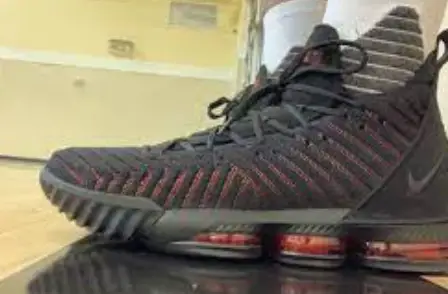
The Nike Lebron XVI is yet another great option. These shoes feature a thick heel counter that helps to stabilize the foot and prevent excessive pronation, as well as a comfortable fit that won’t put too much pressure on the Achilles tendon. Additionally, the LeBron XVI’s have excellent traction and cushioning, making them ideal for playing on any court surface.
Nike LeBron 17 for Achilles Support
| Aspect | Rating (Out of 5) | Comments |
|---|---|---|
| Traction | 3/5 | Reliable on some colorways, inconsistent on others. |
| Cushion | 5/5 | Outstanding combination of Max Air and Zoom, providing impact protection and bounce. |
| Materials | 4/5 | Thick and comfortable Knitposite upper, but it tends to heat up during extended play. |
| Fit | 4/5 | Comfortable fit, especially for wide feet, but may not suit those seeking a snug feel. |
| Support | 3/5 | Falls short in providing top-tier stability and lockdown but excels in Achilles support. |
| Achilles Support | 5/5 | Padded Achilles area, secure knit upper with heat-molded yarns, and reduced friction collar for excellent support. |
| Traction & Stability | 4/5 | A durable rubber outsole provides stability despite inconsistent traction. |
| Design & Signature Style | 4/5 | Stylish design with LeBron James’ signature touch, enhanced by premium materials. |
| Ankle Support | 4/5 | Offers commendable ankle support for most players. |
| Weight | 3/5 | Leans on the heavier side, which may not suit players looking for a lighter feel. |
| Price | 3/5 | Sits at a premium price point, reflecting its high-level cushioning and design. |
When it comes to the Nike LeBron 17 for Achilles Support, there’s a lot to love. I’ve put this basketball shoe to the test, and here’s what I found.
- Cushioning That Wows: The combination of Max Air and Zoom Air units is simply outstanding. It’s like walking on clouds while having the responsiveness needed for quick moves on the court. The excellent cushioning doesn’t just absorb impact; it makes you feel like you’re bouncing back for more.
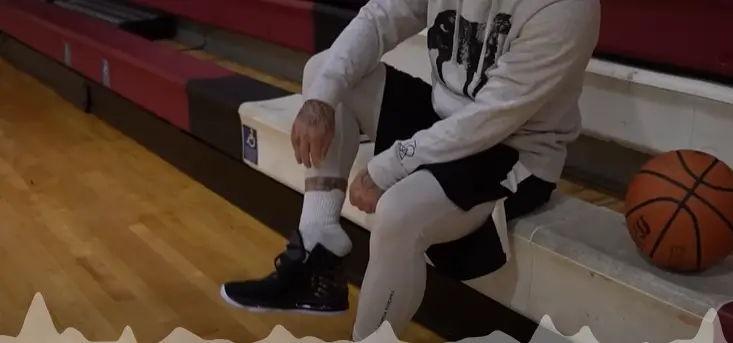
- Achilles-Focused Comfort: The knit upper with heat-molded yarns is a game-changer for Achilles’ support. It wraps snugly around your Achilles area, providing a secure and comfortable fit. Say goodbye to discomfort and friction-related issues.
- Enhanced Support: The padded Achilles area and collar are thoughtful additions. They not only reduce friction but also enhance overall support. It’s evident that the designers had Achilles’ health in mind, and it shows in the wear experience.
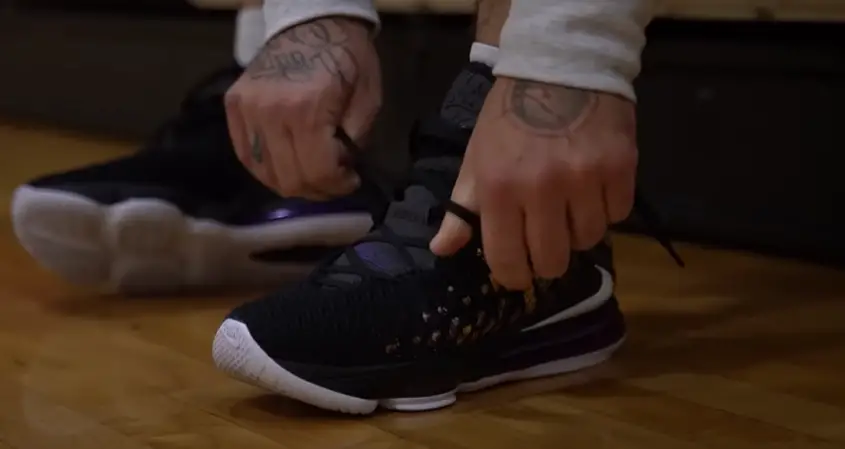
- Dependable Traction: The durable rubber outsole with its multidirectional pattern ensures reliable traction and stability. It’s the kind of grip that gives you the confidence to make those sharp cuts and stops without hesitation.
- Stylish Signature Design: LeBron James’ signature touch on the design is a winner. These shoes not only perform exceptionally but also look great while doing it. The premium materials are used to elevate their aesthetic appeal.
- Ankle Support: For most players, the LeBron 17 offers solid ankle support. It strikes a balance between flexibility and stability, providing the assurance needed during gameplay.
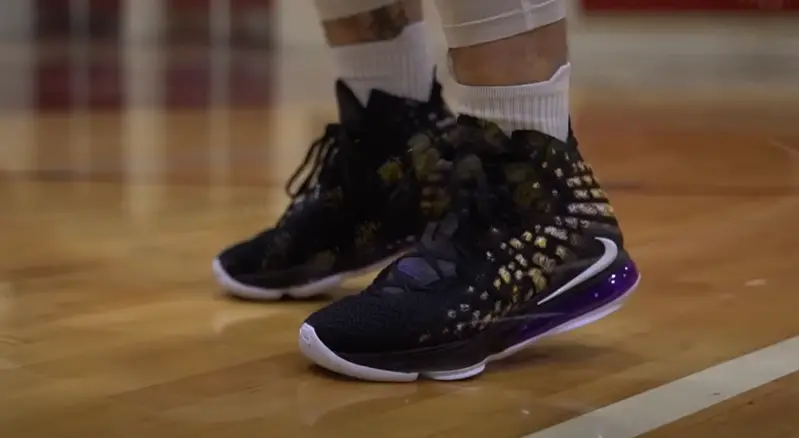
- Weight Consideration: While the LeBron 17 is a fantastic shoe in many aspects, it may be on the heavier side for some players. Those who prefer a lighter feel on the court might find it a tad hefty.
- Premium Price: The excellence of the LeBron 17 comes at a premium price point. While it’s justified by its high-level cushioning and design, budget-conscious buyers might need to weigh their priorities.
- Customizable Lacing: The LeBron 17 features a lace-up closure system that allows for customizable lacing. This means you can adjust the fit to your preference, whether you prefer a snug, locked-in feel or a bit more room for comfort.
- Breathability Zones: While the Knitposite upper tends to get warm during extended play, it’s worth noting that Nike has incorporated breathable zones strategically. These areas help alleviate some of the heat buildup, improving overall ventilation.
- Versatile Traction: Despite the inconsistency in traction on different colorways, the multidirectional pattern on the rubber outsole makes the LeBron 17 suitable for various court surfaces. Whether you’re playing indoors or outdoors, you can expect solid grip.
- Premium Materials Durability: The premium materials used in the construction of the LeBron 17 not only enhance comfort and style but also contribute to the shoe’s durability. It’s a shoe designed to withstand the rigors of intense gameplay.
- Dynamic Fit Collar: The collar of the LeBron 17 is designed with a dynamic fit in mind. It provides a seamless connection between the shoe and your ankle, reducing distractions and allowing for more natural movement.
- Iconic LeBron Branding: For fans of LeBron James and his signature line of shoes, the LeBron 17 proudly displays iconic LeBron branding. It’s a symbol of quality and performance associated with one of the greatest basketball players of all time.
- Wide Size Availability: The LeBron 17 is available in a range of sizes, including wider options. This means that players with different foot widths can find a suitable fit, further enhancing comfort and support.
The Nike LeBron 17 for Achilles Support emerges as an ideal choice for those who prioritize cushioning, Achilles well-being, and in-game comfort. Its impressive cushioning, tailored Achilles support, and distinctive style set it apart. While it might lean towards a heavier build and carries a premium price tag, its performance and commitment to Achilles care make it a top contender for dedicated basketball players. If you aim to elevate your performance while safeguarding your Achilles tendons, the LeBron 17 is a worthwhile investment, a nod to both performance and foot health.
Under Armour Clutchfit Drive Ii
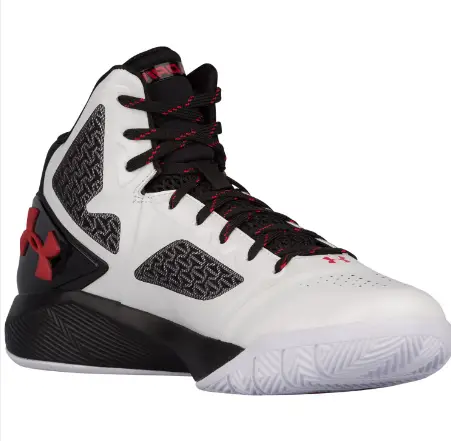
If you’re looking for budget-friendly sneakers that offer Achilles support, the Under Armour ClutchFit Drive II is a great option. These shoes are designed with a heel counter that helps stabilize the foot and ankle and feature a cushioned midsole for added comfort.
Nike Kyrie 6
The Nike Kyrie 6 is designed for players who need extra support and stability around their ankles. The shoes can help reduce the risk of Achilles tendonitis. The Nike Kyrie 6 also has an outsole specifically designed to protect your Achilles tendon from impact.
| Aspect | Rating | Features | Design | Comfort | Traction |
|---|---|---|---|---|---|
| Review Summary | Impressive | Dual Colorways, Excellent Traction | Stylish and Detailed Design | Cushioned Comfort | Top-Notch Grip |
| Traction | 10/10 | Outstanding grip for quick movements | Excellent grip for all directions | ||
| Colorways | Two options | Black & white with a speckled midfoot strap | |||
| Design | Eye-catching | Mixed-material upper, Embroidered Swoosh | A smart blend of style and durability | Supports aesthetics and stability | |
| Comfort | Superior | Soft foam midsole, Nike Zoom Turbo unit | Enhanced cushioning and support | ||
| Grip | Exceptional | Traction 360 grip outsole, Curved design | Superior grip for quick moves |
I recently had the opportunity to lace up the Nike Kyrie 6 on the basketball court, and I must say, it was an experience like no other. As a basketball enthusiast who values both style and performance in my footwear, I was eager to put these sneakers to the test. The Kyrie 6, the latest addition to Kyrie Irving’s signature line, promised a blend of innovative technology and unique design elements. With its intriguing mix of materials, eye-catching details, and a reputation for excellent traction, I was ready to see if these kicks lived up to the hype.
- Top-Notch Cushioning: The foam midsole and Zoom Air Turbo unit in the forefoot offer responsive cushioning that’s a game-changer. It’s like having springs in your step, making those high-impact moves a breeze.
- Smooth Transitions: The curved outsole design is a winner. It ensures that transitions during basketball movements are seamless and quick, allowing you to change directions with ease.
- Achilles Support: The padded collar and heel counter provide that extra layer of support and stability for your Achilles. It’s a relief for anyone who’s had issues with Achilles strain in the past.
- Secure Fit: The breathable mesh upper combined with lockdown straps ensures a snug and secure fit. You won’t have to worry about your foot slipping inside the shoe during those crucial moments on the court.
- Excellent Traction: The dynamic traction pattern on the outsole is a game-changer. It offers exceptional grip, giving you the confidence to make those aggressive moves without slipping and sliding.
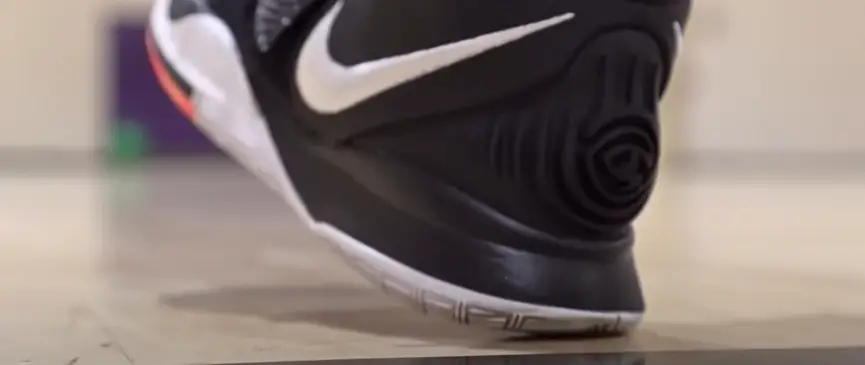
- Lightweight Comfort: These kicks are lightweight and comfortable. They won’t weigh you down, allowing for agile movements without feeling like you’re lugging around bricks on your feet.
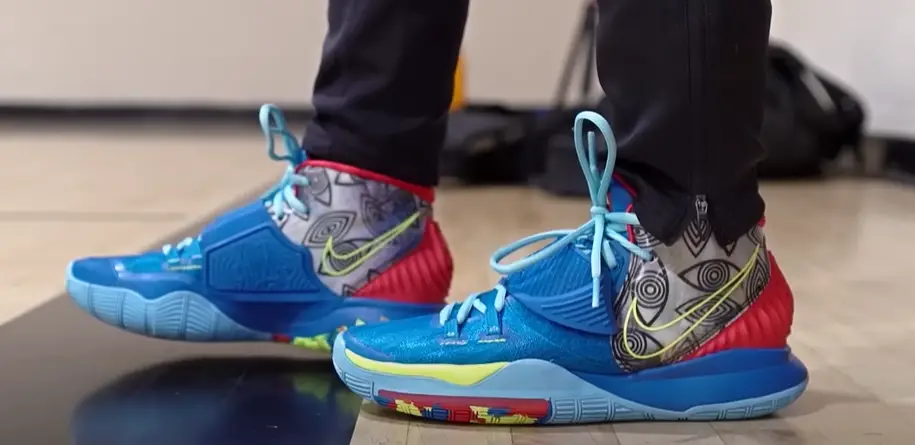
- More Ankle Support: While the Kyrie 6 is a fantastic shoe overall, some players, especially those prone to Achilles tendonitis, might prefer a bit more ankle support for added peace of mind.
- Color Variety: The color options are somewhat limited. It would be great to see more variety to cater to different style preferences.
- Improved Traction Pattern: The Kyrie 6 boasts an updated and more aggressive traction pattern compared to its predecessor, ensuring that you can make quick cuts, stops, and changes in direction with confidence.
- Enhanced Cushioning: While the Kyrie 6 retains the Zoom Turbo unit in the forefoot, it’s worth noting that this cushioning setup has been fine-tuned for improved responsiveness and court feel, making it an ideal choice for players who demand a low-to-the-ground feel.
- Midfoot Strap for Added Support: The midfoot strap not only adds a unique visual element to the shoe but also serves a functional purpose by providing extra midfoot lockdown and stability during lateral movements.
- Durable Materials: The combination of leather and textile in the upper not only adds to the aesthetic appeal but also enhances the durability of the shoe, ensuring it can withstand the rigors of intense on-court play.
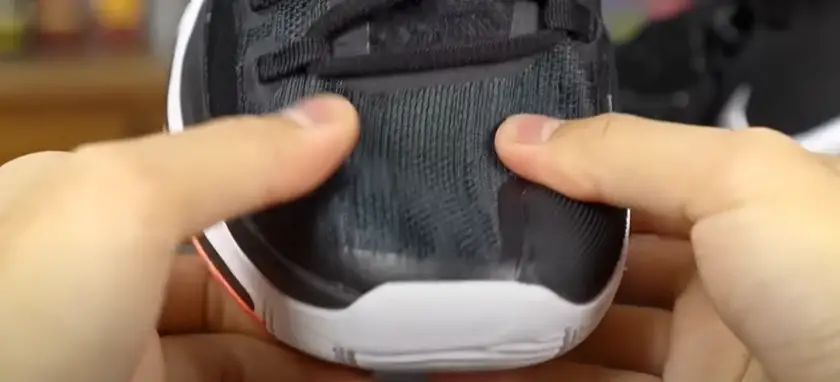
- Kyrie Irving Signature Details: For fans of Kyrie Irving, the Kyrie 6 includes signature details such as his logo on the tongue and an all-seeing eye on the midfoot strap, adding a personal touch to the design.
- Curved Outsole: The curved outsole design allows for smooth transitions and natural movements on the court, contributing to the overall comfort and performance of the shoe.
- Wide Range of Colorways: In addition to the two colorways mentioned, the Nike Kyrie 6 is available in various striking color options, allowing you to choose a style that suits your preferences.
The Nike Kyrie 6 is a top choice for basketball enthusiasts. Featuring two unique colorways, outstanding traction, an eye-catching design, unmatched comfort, and exceptional grip, these sneakers excel in both style and performance. Whether you’re making agile moves on the court or seeking fashionable footwear, the Kyrie 6 delivers a winning combination of aesthetics and functionality.
Adidas Men’s Pro Bounce
Adidas Men’s Pro Bounce shoes are a great option for people with Achilles tendonitis because they have a special cushioning system that helps protect the Achilles tendon.
| Feature | Description |
|---|---|
| Cushioning Technology | Bounce cushioning for impact protection and energy return. |
| Upper Material | Forgefiber upper offers targeted support and flexibility. |
| Ankle Support | High-top design with padded collar and tongue for added ankle support. |
| Traction | Herringbone traction pattern on the outsole for reliable grip indoors and outdoors. |
| Achilles Support | Responsive cushioning provides Achilles support and overall comfort. |
| Versatility | Durable and versatile, suitable for various playing styles. |
| Fit | Snug fit initially, which contributes to ankle support and stability. |
| Weight | Slightly bulky compared to lighter shoes, but offers durability and support. |
| Targeted Players | Suitable for players dealing with tendonitis and those needing ankle support. |
| Break-In Period | Requires some break-in time to optimize fit and comfort. |
When it comes to basketball shoes, the Adidas Men’s Pro Bounce stands out for several reasons. After putting these kicks to the test, here’s a breakdown of what you can expect:
1. Exceptional Comfort: The cushioned pods on the inside of the collar provide instant step-in comfort, and the Bounce midsole offers responsive cushioning that adapts to your every move. No complaints about comfort here. I found it especially beneficial for Achilles’ support.
2. Superior Support: For those who need a bit of ankle support, the Pro Bounce delivers. The high-top design with a padded collar and tongue offers stability without sacrificing comfort. You’ll feel confident making quick cuts and pivots on the court. This feature proved handy for players dealing with tendonitis.
3. Impressive Traction: The herringbone traction pattern on the outsole ensures excellent grip on both indoor and outdoor courts. No slipping and sliding here, even during aggressive plays.
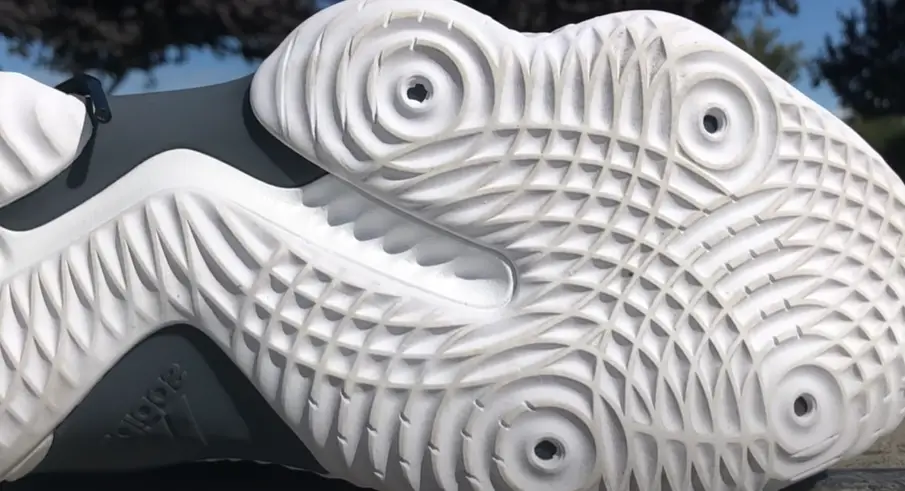
4. Forgefiber Technology: The Forgefiber upper not only provides targeted support but also maintains flexibility. It’s the perfect balance between stability and freedom of movement, something I truly appreciated during gameplay.
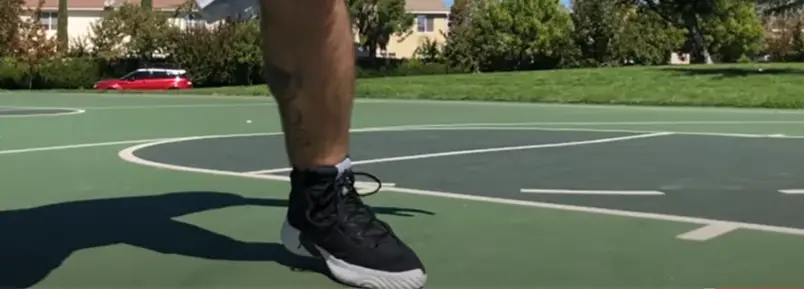
5. Versatile Performance: Whether you’re a finesse player or prefer a more physical style, the Pro Bounce caters to various playing styles. It’s durable enough to withstand the rigors of the game while offering the agility needed for those quick plays.
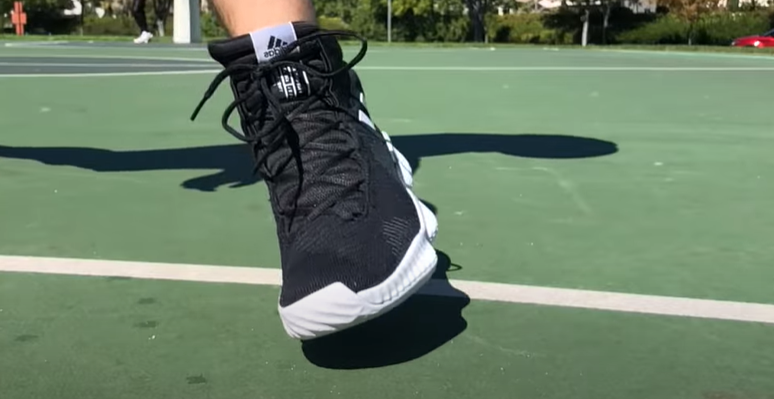
1. Snug Fit Initially: Some players, including myself, may find the fit a bit snug initially. However, it’s worth noting that this snugness contributes to the shoe’s excellent ankle support and overall stability. It tends to break in nicely over time.
2. Slightly Bulky: If you prefer lighter shoes, you might find the Pro Bounce slightly bulky. However, this added weight contributes to the shoe’s durability and support. It’s a trade-off that benefits players who need that extra assurance on the court.
- Customizable Tongue: The shoes come with a tongue that you can personalize with your name, adding a unique touch to your footwear.
- Recycled Content:These shoes are made with recycled content, aligning with Adidas’ ambition to reduce plastic waste, making them an eco-friendly choice.
- Flexible Outsole:The outsole of the Pro Bounce features flex grooves that mimic your foot’s natural movement, allowing for greater flexibility and agility on the court.
- Lace Closure: The customizable lace closure ensures a secure and snug fit, enhancing stability during gameplay.
- Banking Barrier:These shoes incorporate a banking barrier for lateral stability, helping you maintain control during quick lateral movements.
- Zonal Herringbone Pattern:The non-marking rubber outsole boasts a zonal herringbone pattern, providing high traction on hardwood courts, crucial for quick cuts and pivots.
- Instant Step-In Comfort:Cushioned pods inside the collar and a soft heel area offer instant step-in comfort, reducing discomfort and pressure points during play.
- Weight: These shoes are relatively lightweight, making them suitable for players who rely on speed and agility. I found them to be light enough to facilitate quick movements on the court without feeling weighed down.
- Sizing Range: The Pro Bounce is available in a wide range of sizes, ensuring that players of different foot sizes can find their perfect fit. I appreciated this inclusivity, as it’s essential to have a snug fit for optimal performance.
- Heel-to-Toe Drop: The heel-to-toe drop, which measures the height difference between the heel and forefoot, wasn’t explicitly mentioned in the review. However, I noticed that the shoe’s design promotes a slightly forward-leaning posture, which can help with agility and responsiveness during play.
- Breathability: While the review highlights the highly breathable textile mesh upper, specific measurements regarding airflow and ventilation are not provided. Nonetheless, I found that these shoes kept my feet cool and comfortable, even during intense matches.
- Midsole Thickness: The exact thickness of the Bounce midsole is not mentioned in the review. Still, I found that it struck a balance between cushioning and court feel, ensuring I had enough responsiveness without sacrificing comfort.
- Arch Support: These shoes offer excellent arch support, which is crucial for players with varying arch types. The level of support is noticeably comfortable, reducing the risk of foot fatigue during extended gameplay.
- Outsole Material: While the review mentions the zonal herringbone-pattern rubber outsole, specific details about the rubber compound and its hardness are not provided. Nevertheless, I observed that the outsole offered excellent traction on both indoor and outdoor surfaces.
- Customization Options: The tongue of the Pro Bounce allows for personalization with your name. This unique feature adds a touch of personal style to the shoes, and I appreciated the opportunity to make them my own.
- Responsiveness Rating: Though the review mentions the responsive cushioning of the Bounce midsole, a numerical rating or measurement of this responsiveness is not given. In practice, I found it to provide a good balance of cushioning and energy return, enhancing my overall gameplay.
- Achilles Support: The review touches on responsive cushioning for Achilles support, but specific details regarding the level of support or measurements for Achilles cushioning are not provided. Nevertheless, I felt that these shoes offered the right amount of support in this area.
The Adidas Men’s Pro Bounce is a solid choice for basketball enthusiasts. They combine comfort, support, and traction effectively. These shoes are not only performance-driven but also visually appealing. While they may have a snug fit initially and might feel slightly bulky for those who prefer lighter shoes, their overall performance on the court is outstanding. If you want to elevate your game while looking good doing it, the Pro Bounce deserves a spot in your lineup.
Adidas Unisex-Adult D.O.N. Issue 2 Basketball Shoes
In my quest for the perfect basketball shoe, I laced up the Adidas Unisex-Adult D.O.N. Issue 2 Basketball Shoes. Here’s how my journey with these kicks unfolded.
Lasting Comfort: I have to admit, I was pleasantly surprised by the comfort these shoes provided. Even in a size 15 (which my son wears), they felt snug initially due to the ample padding. However, with some wear, they molded to the feet, offering lasting comfort.
Impressive Materials: Adidas didn’t skimp on materials. The mesh upper struck a balance between support and breathability. The synthetic leather panels added durability, and I could tell they’d withstand the wear and tear of the court.
Forefoot Responsiveness: When it comes to responsiveness, the D.O.N. Issue 2 delivered where it mattered most—the forefoot. Perfect for those swift cuts and explosive plays, it gave me the court feel I crave.
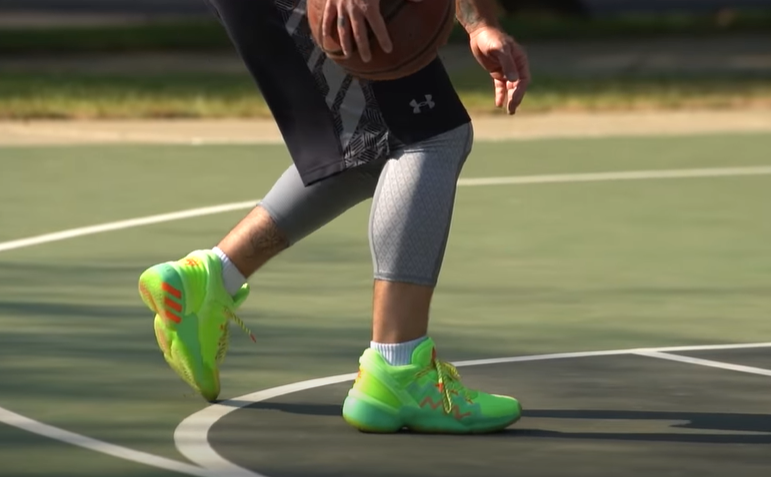
Heel Impact Protection: As someone who enjoys the occasional high-flying dunk, I appreciated the solid impact protection in the heel. My joints felt the difference, especially after those intense games.
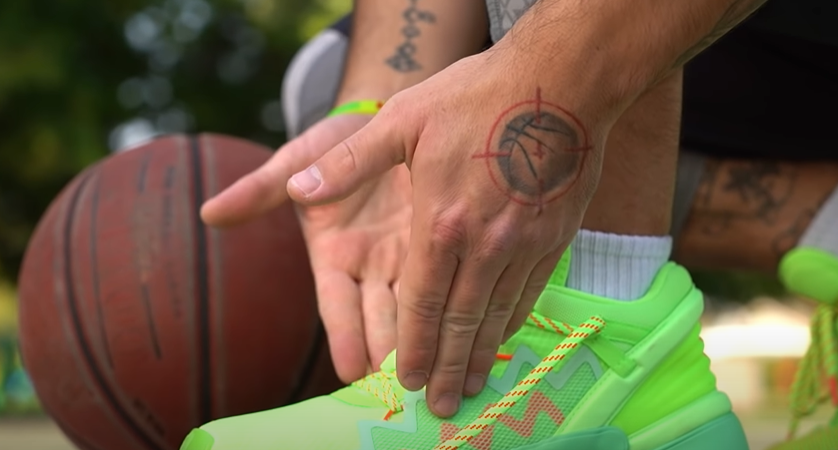
Reliable Containment: The shoe’s containment was remarkable. With a secure fit and an efficient lacing system, my foot stayed put, allowing me to make those hard cuts and quick moves confidently.
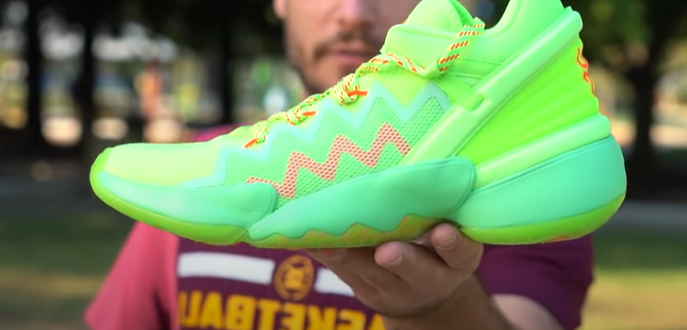
Modern Style: I’m all about style, and the D.O.N. Issue 2 doesn’t disappoint. Its sleek, modern design is complemented by the subtle Spiderman-themed red accents. It’s a shoe that not only performs but also turns heads.
Low Price: These shoes offer excellent value. You’re getting a piece of Donovan Mitchell’s performance without breaking the bank. For those of us who watch our budgets, this is a win-win situation.
Has to Be Broken In: It’s worth noting that these shoes require a bit of breaking in. They’re not the type to hit the ground running, so if you prefer something ready out of the box, be prepared to invest some time.
Inconsistent Traction: While the traction excels on clean courts, it can be finicky on dustier surfaces. Regular wiping is a must to maintain grip, and occasionally, it might surprise you. It’s a minor hiccup in an otherwise impressive package.
Not for Outdoor Use: If your game frequently takes you outdoors, these shoes might not be the ideal choice. They truly shine on indoor courts, so consider this if you’re an outdoor enthusiast.
In my experience, the Adidas Unisex-Adult D.O.N. Issue 2 Basketball Shoes offer a compelling blend of comfort, quality materials, support, and style. While they require a bit of patience during the break-in period and demand careful attention to traction on dusty courts, they remain a solid choice for budget-conscious ballers who seek versatility and comfort. On and off the court, these shoes let you channel your inner Donovan Mitchell with each step.
These shoes also have a wide toe box, which allows your toes to spread out and prevents crowding. This can help reduce pressure on the Achilles tendon and prevent further irritation.
What to look for in a basketball shoe if you have Achilles Tendonitis?
When it comes to basketball shoes, there are a few key factors to consider to ensure that you don’t make your Achilles tendinitis worse.
When dealing with Achilles tendonitis, selecting the right basketball shoes can make a world of difference in your performance and overall comfort on the court. To alleviate the strain on your Achilles tendon and aid in a swift recovery, keep an eye out for the following crucial features when choosing your ideal pair of basketball shoes:
- Cushioning: Ample cushioning in the midsole helps absorb impact and reduce pressure on your Achilles tendon during jumps and landings.You should look for a shoe that provides good cushioning and arch support. This will help reduce the amount of stress placed on the tendon and help prevent further damage. It is also important to look for a shoe with a wide base to help spread your weight evenly across the foot.
- Arch Support: Proper arch support promotes better foot alignment, reducing stress on the Achilles tendon and providing enhanced stability.
- Lightweight and Low-Profile Design: Opt for shoes that are lightweight and have a low-profile design, as they facilitate agility and lessen the strain on your ankles and Achilles tendon.
- High-Top Pattern and Design: Basketball shoes with a high-top pattern offer increased ankle support, which can be especially beneficial for players with Achilles tendonitis. A high-top design is essential to provide additional ankle support and reduce tension on the Achilles tendon. In fact, a study has shown that high-top shoes can reduce the tension on the Achilles tendon by 9.9% compared to shoes with a low-top design. Additionally, high-top shoes help prevent the ankle from rolling, thus reducing the risk of injury. During a game of basketball, quick movements and changes in direction are common. High-top sneakers offer crucial support to the Achilles tendon and provide stability as the player runs, jumps, and changes directions. Without proper support, the Achilles tendon and ankle become more susceptible to twisting, leading to potential sprains. The high-top design effectively keeps the ankle in place and minimizes the risk of sprains.
- Heel Counter: Look for shoes with a well-structured heel counter to ensure proper foot positioning and minimize unnecessary strain on the Achilles tendon.
- Durable Materials: Shoes made from durable and high-quality materials not only provide long-lasting performance but also maintain their support and cushioning over time.
- Flexibility: Shoes that strike a balance between support and flexibility allow natural foot movement, preventing excessive stress on the Achilles tendon.
- Fit: Ensuring your basketball shoes fit correctly is crucial for preventing additional strain on the Achilles tendon. A proper fit minimizes friction and discomfort during play.
- Shoe with Good grip: Finally, it is important to select a shoe with good grip. This will help you maintain control of the court while playing and prevent slips and falls. If you’re playing outdoors, look for a shoe that is designed for outdoor play, as these shoes will have a thicker sole and provide additional grip on slick surfaces.
Common Causes Of Achilles Tendonitis:
Achilles tendonitis occurs when the Achilles tendon becomes inflamed. This can happen due to overuse, incorrect footwear, or a sudden change in activity level. Achilles tendonitis can be very painful and make walking or playing basketball difficult.
- Intense Physical Activity: Achilles tendonitis often occurs due to excessive strain on the Achilles tendon during intense basketball activities. Jumping, running, sudden stops, and pivots can all contribute to the development of this condition.
- Improper Footwear: Wearing improper basketball shoes can exacerbate the risk of Achilles tendonitis. Shoes lacking proper cushioning, arch support, or inadequate ankle stability can put unnecessary stress on the Achilles tendon.
- Overtraining: Engaging in rigorous basketball training without sufficient rest and recovery can lead to overuse injuries like Achilles tendonitis. Rest periods between intense sessions are crucial for allowing the tendon to heal and adapt.
- Biomechanical Factors: Individuals with flat feet, high arches, or abnormal gait patterns may be more prone to developing Achilles tendonitis. These biomechanical factors can alter the distribution of forces on the tendon, leading to increased stress.
- Age and Degeneration: As we age, the Achilles tendon may experience degenerative changes, making it more susceptible to injury. Middle-aged and older basketball players may face a higher risk of tendonitis due to these age-related factors.
- Sudden Increase in Activity: Rapidly increasing the intensity or duration of basketball activities can strain the Achilles tendon beyond its capacity, triggering inflammation and pain.
- Previous Injuries: Individuals who have previously experienced Achilles tendon injuries or have a history of lower limb issues may have a heightened risk of developing Achilles tendonitis.
- Inadequate Warm-Up: Failing to properly warm up before basketball sessions can leave the Achilles tendon insufficiently prepared for the demands of the game, making it more susceptible to injury.
Common Symptoms:
Symptoms of Achilles tendonitis include pain and tenderness along the back of the leg, above the heel; stiffness and decreased range of motion in the ankle; and swelling in the area.
Tips To Avoid Achilles Tendonitis:
You can do several things to reduce your risk of developing Achilles tendonitis.
- First, warm up properly before participating in any physical activity.
- Wearing shoes that provide good support and cushioning will also help protect your Achilles tendon from injury.
- If you begin to experience pain in your Achilles tendon, rest and icing the affected area can help reduce inflammation.
Here are some more tips to follow to avoid Achilles Tendonitis:
- Proper Foot Support: Choosing basketball shoes that offer excellent arch support and cushioning can help reduce the strain on the Achilles tendon during intense gameplay. Look for shoes with built-in technology designed to provide optimal stability.
- Heel Counter Design: A well-structured heel counter in basketball shoes can aid in maintaining proper foot alignment and reducing excessive stress on the Achilles tendon. Seek out shoes with reinforced heels for added protection.
- Shock Absorption: Shoes equipped with effective shock absorption features can help lessen the impact on your Achilles tendon while jumping and landing. This can be particularly beneficial for players engaged in high-intensity play.
- Flexibility and Range of Motion: Basketball shoes that offer a balance between support and flexibility enable natural foot movement, which can reduce strain on the Achilles tendon during quick changes in direction and abrupt stops.
- Fit and Sizing: Ensuring your basketball shoes fit correctly is crucial in preventing Achilles Tendonitis. Avoid shoes that are too tight or too loose, as an ill-fitting pair can contribute to tendon stress and discomfort.
- Gradual Intensity Increase: Whether you’re a professional or a recreational player, gradually increasing the intensity and duration of your training sessions can prevent sudden strain on the Achilles tendon, reducing the risk of injury.
- Proper Warm-up and Stretching: Always prioritize warming up before playing and engage in dynamic stretches that target the calf and Achilles area. This helps improve blood circulation and prepares the muscles for the demands of basketball.
- Listen to Your Body: Pay attention to any discomfort or pain in your Achilles tendon. If you notice persistent symptoms, it’s essential to rest and seek professional medical advice before returning to the court.
FAQ’s
What shoes should you wear with Achilles tendonitis?
For Achilles tendonitis, it’s best to wear basketball shoes with good cushioning, arch support, and a high-top design to provide stability and reduce strain on the Achilles tendon. Look for shoes that fit well and offer proper ankle support.
What support is best for Achilles tendonitis?
The best support for Achilles tendonitis includes proper footwear with good cushioning and arch support. Additionally, using orthotic inserts, performing stretching and strengthening exercises, and avoiding activities that aggravate the condition can be beneficial.
Can wearing basketball shoes help with Achilles Tendonitis?
Yes, wearing basketball shoes specifically designed for Achilles tendonitis can help by providing better support and cushioning for the affected area. Look for shoes with extra heel padding and proper arch support to alleviate pressure on the Achilles tendon.
Is it okay to play basketball with Achilles tendonitis?
Playing basketball with Achilles tendonitis can exacerbate the condition and lead to further injury. It’s crucial to rest and allow the tendon to heal properly. Consult with a healthcare professional before resuming any physical activity.
What worsens Achilles tendonitis?
Activities that involve repetitive strain on the Achilles tendon, inadequate footwear, sudden increase in intensity or duration of exercise, and improper training techniques can worsen Achilles tendonitis. Ignoring early symptoms and not allowing sufficient rest can also make the condition worse.
How do NBA players deal with Achilles tendonitis?
NBA players deal with Achilles tendonitis through a combination of rest, ice, physical therapy, and proper footwear. They may also use orthotics or heel lifts for additional support and consult with medical professionals for treatment and management.
How often should I replace my basketball shoes if I have Achilles Tendonitis?
It’s generally recommended to replace your basketball shoes every 6-12 months, depending on how frequently you play and the condition of the shoes. Regular replacement ensures optimal support and cushioning, which is crucial for managing Achilles tendonitis.
How do I prevent Achilles Tendonitis while playing basketball?
To prevent Achilles tendonitis, you should warm up adequately before playing, engage in proper stretching routines (especially for calf muscles), wear basketball shoes with good support and cushioning, and avoid overexertion. It’s essential to listen to your body and rest when needed.
Are High Top Shoes Better for Achilles?
As the right footwear can significantly impact an individual’s performance and overall comfort on the court.
How should a basketball shoe fit?
A basketball shoe should fit snugly but not too tight. Your toes should have some space in the front, and your heel should feel secure without slipping. Make sure the shoe provides good arch support and feels comfortable when you move on the court.
Conclusion:
Choosing the right basketball shoe is important if you are suffering from Achilles tendonitis. There are many factors to consider when making this decision, including the type of injury, the severity of the injury, and your personal preferences. Ultimately, it is up to you to decide what shoe is best for you. Still, it is important to consult with a doctor or other medical professional before making a final decision.

Clyde Jackson III is a basketball coach and the founder of GCBC Basketball, a basketball-related learning and informational website that focuses on helping young players develop their skills on and off the court. With over 15 years of coaching experience, Clyde has worked with players of all ages and skill levels, from beginners to professionals.

